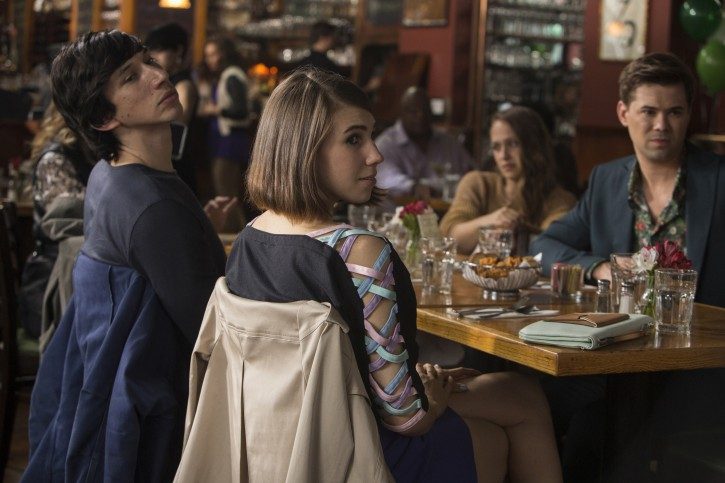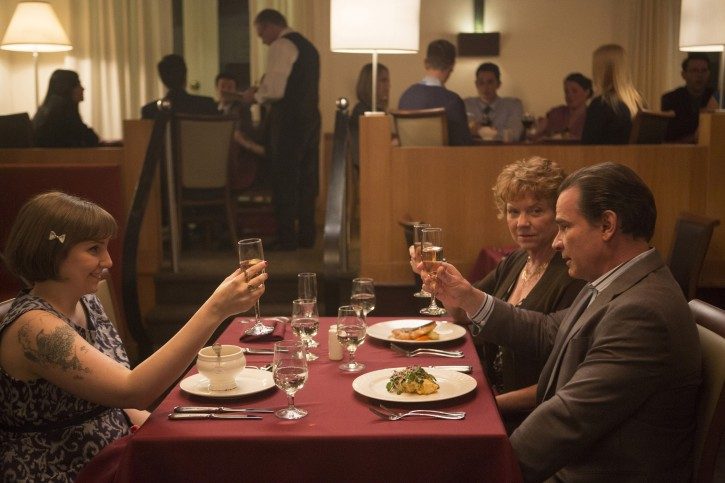“What do Judy Garland and Lady Gaga have in common?”
“They’re both white?”
This exchange between Elijah and Marnie pretty much sums up everything that is wrong with the self-serving pile of dog excrement that happens to be the series, Girls. Amidst all the complaints, by fans of the show, that those of us hating on the show do so out of spite and jealousy, I have attempted to reconnect with the series, as it enters its fourth season. Granted, I never had a connection with this show, to begin with, but that is beside the point.
I really, truly tried to give Girls another chance, but I couldn’t even get through the first half of the 30-minute (26 minutes and 40 seconds, if you want to get technical) episode, without wanting to pull my hair out. The show is over-indulgent. The characters lack authenticity, excluding Hannah, because as deluded as she is, I think Lena Dunham is not capable of playing anyone but herself.
As Hannah, she encapsulates all that is Dunham, and she is, convolutedly unlike any other human being, on the planet. Add in the fact that the show, set in New York, has very little diversity beyond the upper crust white, WASP-y environment where Hannah and her friends/frenemies, live, work, and play, and I just cannot like anything about this show.
All of the other characters are either other versions of Dunham, or they are people who do not act realistic to how people would act around her. This is Lena Dunham’s virtual playground, her dream world, where everyone acts exactly how Dunham would want them to act, towards her.
Dunham writes characters, as a way to manipulate her audience into how she wants them to feel, about her. Jemima Kirkle’s Jessa, is her foil, so the audience can empathize with Hannah, and Dunham herself, when Jessa treats her like a bitch. The sad thing is, as much as Jessa has issues, when it comes to bitching out Hannah in a bathroom, she’s right. Hannah, much like Lena, is so invested in herself, and always wanting to be seen as the most prolific millennial, the voice of her generation, she does not realize how true the criticisms of Hannah are. She’s too busy waiting for our sympathy.
I don’t dislike this show because I’m a jealous hater. I dislike Girls because the writing is absolutely ridiculous. It’s self-indulgent, and it’s not funny. This is supposed to be a comedy. Instead, it’s a sad caricature of a show about stereotypical caricatures of white, upper-class, millennial women, obsessed with themselves, and all they think they have to offer this world.
Much like Dunham headed to the Midwest, Hannah is heading back to school, in Iowa, leaving her New York life, her boyfriend (who is about to have a mental breakdown, because, you know, he can’t live without Hannah), Adam, and her annoying parents, behind. Hannah consistently baits her friends, family, and Adam into saying how much they are going to miss her, and how much she contributes to their lives. She isn’t sure what to do, when she does not get the answer she had hoped for; no one is throwing themselves down at her feet, or throwing themselves all over her, and it is so awkward to see her reaction.
There are entire moments, pauses in the show, filled with awkward silence, and replaced with equally as awkward and clunky dialogue. None of the characters seem genuine. I don’t believe any of them. Not even Anthony Edwards, as Shoshanna’s father, who had an awful, awkward fight, with her mother, Mel. Both of Shoshanna’s parents happen to be named Mel Shapiro, by the way. Her mother, played by a God-awful looking Ana Gasteyer, has a random fight with the other Mel, over Shoshanna’s college diploma, and where it is getting sent. The fight does little, except to show us where Shoshana got her, obviously self-absorbed personality traits.
The acting is equally as terrible. Why do actors put their hands over their faces, when they are supposed to be sobbing, with tears down their faces? Nobody believes Allison Williams was sobbing after Marnie is run off her jazz brunch pseudo-stage, by a small pack of rude children. Speaking of Williams, there was nothing shocking about the ass-eating scene between Marnie and Desi, in the beginning of the episode. The shot served absolutely no purpose.
The sex, beyond the ass-eating looked staged, as Desi moved back, just enough, to see they were not really having sex. Obviously, the goal of the shot was to show that Desi and Marnie are fucking one another, but that could have been accomplished by showing any form of sex happening. Given the fact that Williams designed a faceguard, so her co-star was not actually up her ass, the scene is so quick, it is hardly worth the effort she put into it. Desi and Marnie do not appear to go together, anyway. Lord knows, their singing together was not cohesive. They sounded like two people, singing to the beat of their own drummers, which does not allow for them to find the harmonies, a great singing duo needs to find.
As for Jessa, the only truth in the show comes from a character played by Natasha Lyonne, who is coming to take her mother, Beadie, home, to Connecticut. Beadie (played by Louise Lasser), is Jessa’s employer, and Lyonne’s character, Rickey, is pretty pissed off at all the trouble Jessa has caused, for her mother. Rickey, who gives off a male, cross-dressing, drag king, lesbian vibe, goes into an intense diatribe about how her generation is so much more respectful than Jessa and her group of millennial friends. Rickey doesn’t understand girls like these, and their selfish nature. It’s the generation gap.
I tend to agree. As weird as Rickey is, her words ring the truest, of any, in “Iowa.” Those of us, in Gen X, do not understand why those in the generation, just below us, the millennials, are presented as being so obsessed with themselves, and how important and well liked they think they are… and no one is telling them anything different, so they keep on believing it.
Just one note on Beadie. If she had to be in a wheelchair, they could have used an actual wheelchair….not this stolen from a hospital wheelchair, which are so uncomfortable. This is a huge pet peeve of mine. Of course, poor people have no choice but to use those hospital wheelchairs, though Lena Dunham would obviously not understand the nuance of this.
With every inch of the show embedded with the inner thoughts of Lena Dunham, someone who thinks she is far more important and far more talented than the mediocrity she produces and writes, you might as well just watch Tiny Furniture on loop. It’s the same story, with a different name. This show just happens to have some guest stars, that are really talented (like Rita Wilson, as Marnie’s mom), but seem to lose all that talent, once given a script, with Dunham’s ode to herself, plastered all over it. I just don’t understand why they bothered to be on this show, at all.



Comments